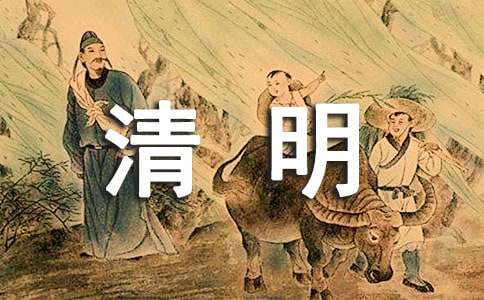- 相关推荐
清明节的由来(英文版)
清明节的由来用英文怎么说?不知道的就随小编一起阅读了解吧。

清明节的由来(英文版)
(Tomb-Sweeping Day) Qing Ming Jie(All Souls' Day)
Qing Ming is a time to remember the dead and the dearly departed. More important, it is a period to honour and to pay respect to one's deceased ancestors and family members. Because it reinforces the ethic of filial piety, Qing Ming is a major Chinese festival.
清明节是一个纪念祖先的节日。主要的纪念仪式是扫墓,扫墓是慎终追远、郭亲睦邻及行孝的具体表现;基于上述意义,清明节因此成为华人的重要节日。
Literally meaning "clear" (Qing) and "bright" (Ming), this Chinese festival falls in early spring, on the 106th day after the winter solstice. It is a "spring" festival, and it is an occasion for the whole family to leave the home and to sweep the graves of their forebears. Chinese being practical people this sweeping of the graves is given an extended period, that is, 10 days before and after Qing Ming day. Among some dialect groups a whole month is allocated.
清明节是在仲春和暮春之交,也就是冬至后的106天。扫墓活动通常是在清明节的前十天或后十天。有些地域的人士的扫墓活动长达一个月。
Qing Ming is popularly associated with Jie Zi Zhui, who lived in Shanxi province in 600 B.C. Legend has it that Jie saved his starving lord's life by serving a piece of his own leg. When the lord succeeded in becoming the ruler of a small principality, he invited his faithful follower to join him. However, Jie declined his invitation, preferring to lead a hermit's life with his mother in the mountains.
谈到清明节,有点历史知识的人,都会联想到历史人物介子椎。据历史记载,在两千多年以前的春秋时代,晋国公子重耳逃亡在外,生活艰苦,跟随他的介子椎不惜从自己的腿上割下一块肉让他充饥。后来,重耳回到晋国,作了国君(即晋文公,春秋五霸之一),大事封赏所有跟随他流亡在外的随从,惟独介子椎拒绝接受封赏,他带了母亲隐居绵山。
Believing that he could force Jie out by burning the mountain, the lord ordered his men to set the forest on fire. To his consternation, Jie chose to remain where he was and was burnt to death. To commemorate Jie, the lord ordered all fires in every home to be put out on the anniversary of Jie's death. Thus began the "cold food feast", a day when no food could be cooked since no fire could be lit.
晋文公无计可施,只好放火烧山,他想,介子椎孝顺母亲,一定会带着老母出来。谁知这场大火却把介子椎母子烧死了。为了纪念介子椎,晋文公下令每年的这一天,禁止生火,家家户户只能吃生冷的食物,这就是寒食节的来源。
The "cold food" festival occurs on the eve of Qing Ming and is often considered as part of the Qing Ming festival. As time passes, the Qing Ming festival replaced the "cold food" festival. Whatever practice is observed,the basic observation of Qing Ming is to remember one's elders by making a special effort to visit their graves, ashes or ancestral tablets. To make the visit even more meaningful, some time should be spent to remind the younger members of the family of the lives and contributions of their ancestors, and the story of Jie Zi Zhui who choose death over capitulation.
寒食节是在清明节的前一天,古人常把寒食节的活动延续到清明,久而久之,清明取代了寒食节。拜介子椎的习俗也变成了清明扫墓的习俗了。无论以何种形式纪念,为了使纪念祖先的仪式更有意义,我们应该让年轻一代的家庭成员了解先人过去的奋斗历史,当然,还要学习介子椎宁死不屈的气节。
节日风俗:盛行的习俗与食俗
◎荡秋千 这是中国古代清明节习俗。秋千,意即揪着皮绳而迁移。它的历史很古老,最早叫千秋,后为了避忌讳,改之为秋千。古时的秋千多用树桠枝为架,再拴上彩带做成。后来逐步发展为用两根绳索加上踏板的秋千。荡秋千不仅可以增进健康,而且可以培养勇敢精神,至今为人们特别是儿童所喜爱。
◎蹴鞠 鞠是一种皮球,球皮用皮革做成,球内用毛塞紧。蹴鞠,就是用足去踢球。这是古代清明节时人们喜爱的一种游戏。相传是黄帝发明的,最初目的是用来训练武士。打马球,也是端午之戏之一。马球,是骑在马上,持棍打球,古称击鞠,三国曹植《名都篇》中有“连翩击鞠壤”之句。唐代长安,有宽大的球场,玄宗、敬宗等皇帝均喜马球。章怀太子墓中《马球图》,画出了唐代马球的兴盛:画上,二十多匹骏马飞驰,马尾扎结起来,打球者头戴幞巾,足登长靴,手持球杖逐球相击。《析津志》记辽国把打马球作为节日的传统风俗,于端午、重九击球。《金史•礼志》也记金人于端午击球。宋代有“打球乐”舞队。至明代,马球仍流行。
◎放风筝 每逢清明时节,人们不仅白天放,夜间也放。夜里在风筝下或风稳拉线上挂上一串串彩色的小灯笼,像闪烁的明星,被称为“神灯”。过去,有的人把风筝放上蓝天后,便剪断牵线,任凭清风把它们送往天涯海角,据说这样能除病消灾,给自己带来好运。
【清明节的由来(英文版)】相关文章:
清明节由来08-08
中国清明节的由来08-06
关于清明节的由来03-30
清明节的习俗及由来03-13
英文版春节的由来(精选17篇)02-02
清明节的由来和风俗10-15
清明节的传说与由来介绍04-03
清明节踏青习俗的由来04-02
中国清明节的由来与传说08-06
中国春节的由来中英文版09-21
